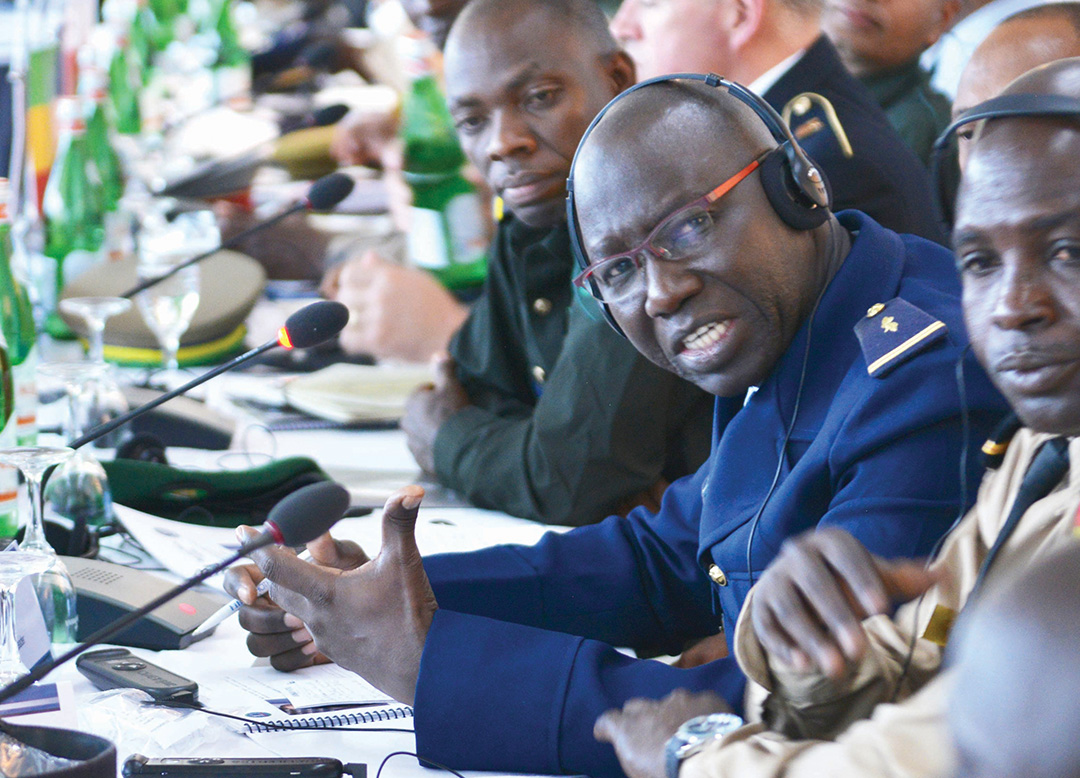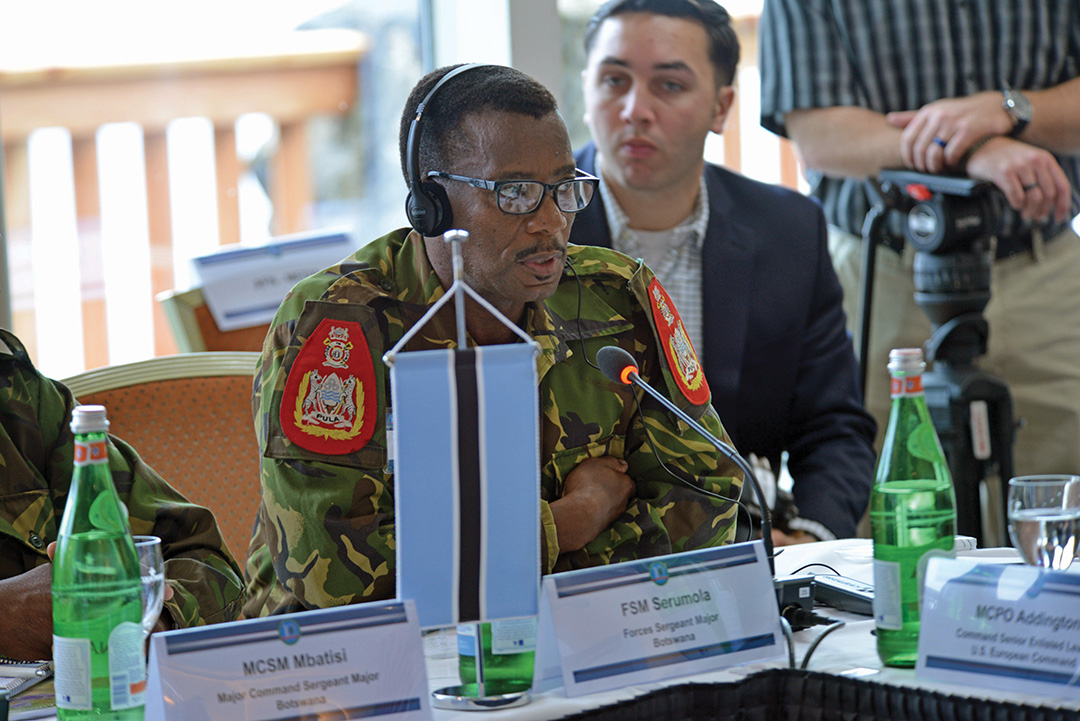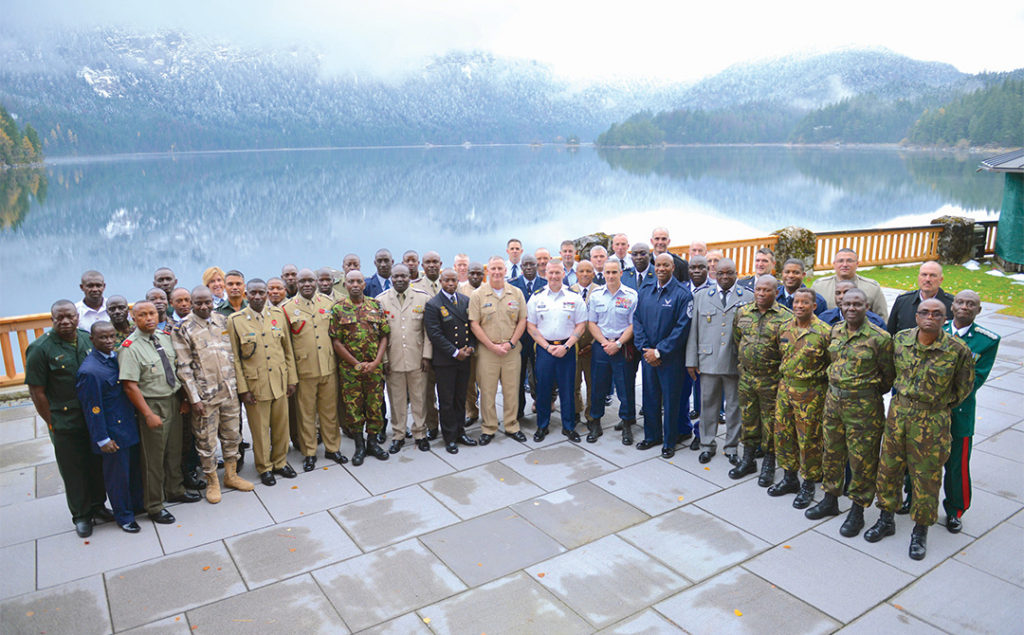Nations Across the Continent Are Seeing the Benefits of Educated, Well-Trained Noncommissioned Officers
ADF STAFF
Photos by STAFF SGT. GRADY JONES/U.S. AFRICA COMMAND
Militaries are generally composed of an officer corps at the top and a high number of enlisted Soldiers, Sailors or Airmen at the bottom. But between the two is a layer of personnel crucial to efficient and professional operations: noncommissioned officers, or NCOs.
NCOs’ duties can differ from one national military to another, but in general they are charged with training and sustaining a mission-ready force and executing strategies that originate in the officer corps. In most militaries, a new recruit will depend on an NCO for basic training, drill and ceremony instruction, and good order and discipline.
Advanced training opportunities haven’t always been available to NCOs, and their roles have not developed as much over the years. During the Cold War, some militaries in the developing world were trained by the Soviet Union or communist bloc countries, which had highly centralized governments and militaries. Some of that rigidity has persisted through the years. When decision-making is centralized, it thickens bureaucracy and can erode trust.

“So the moment you have people feeling they are not empowered to make decisions, where the next higher level needs to make decisions or the next higher level needs to approve — the moment you create that type of situation, you break down trust in your organization,” said Abel Esterhuyse, associate professor at Stellenbosch University in South Africa. “The more you empower people, the more trust you have.”
Retired Brig. Gen. Saleh Bala of Nigeria has trained Soldiers at all levels, and has spent time on the directing staff of the Nigerian Armed Forces Command and Staff College and the National Defense College. He said British and French colonial perspectives influenced an approach that fostered “elitism” in the officer corps in Africa.
“Essentially, the NCO was just left at the subtactical level,” Bala told ADF. “Therefore, the need for the NCO to go to the higher level of critical thinking to be able to do a battlefield quick estimate of the situation in order to make decisions was left to the subaltern, who is an officer.”
Today, Nigeria and other countries are recognizing the need to change this.
“We have a whole paradigm and era shift where technology has advanced, where the paradigm of warfare itself has changed, for which the internet is very important,” Bala said. “The machines we need to operate today need a higher level of intellect. In most armies of the world, you find the NCOs are up to 75 percent to 80 percent.” Bala stressed the importance of NCO training in critical thinking, IT, science and technology and higher levels of leadership.
MODELING SUCCESS ON THE CONTINENT
Militaries are showing interest in developing their NCO corps with more education, training and development. That desire was evident in November 2017 at the five-day inaugural Africa Senior Enlisted Leader Conference (ASELC) in Grainau, Germany, sponsored by U.S. Africa Command.
Thirty-five African NCOs representing 19 countries attended the conference. The countries represented were Botswana, Burkina Faso, Comoros, Ghana, Kenya, Liberia, Madagascar, Malawi, Mali, Mauritius, Mozambique, Nigeria, Rwanda, Senegal, the Seychelles, Sierra Leone, South Africa, Togo and Uganda.
“The majority of them are all seeking the same thing,” said Air Force Command Chief Master Sgt. Ramon Colon-Lopez, the command senior enlisted leader for U.S. Africa Command. “They want autonomy, they want empowerment, and they really want to have the access to their chiefs of defense and information so that they can better advise their senior officers.”
Even now there are some countries taking the lead in developing their NCO corps. Colon-Lopez said Botswana, Ghana, Malawi and Senegal have NCOs who have become senior enlisted advisors to their chiefs of defense.

Botswana in particular is making advances with its NCOs. The Botswana Defence Force (BDF) expressed an interest in integrating NCOs into the headquarters staffing ranks, integrating women into the military and stopping sexual assaults, and adjusting the retirement age for enlisted personnel. The BDF was able to win changes to national legislation that increases the retirement age and advances a proposal to create an inspector-general to deal with sexual assaults and other crimes. Also, now every directorate in the BDF headquarters has a dedicated NCO.
Colon-Lopez said Botswana is a good example of an African model that can be used to inspire other nations on the continent to bolster their NCO ranks. The approach allows African militaries to find solutions that work for them without having a western model imposed on them.
“There wasn’t one single [participant] at our conference that wasn’t seeking a way to better himself and to be a more professional Soldier, Airman or Sailor in order to grow the next crop of … Soldiers to fill their boots at some point,” he said.
MALAWI TAKES ACTION
One of the takeaways from ASELC in Germany in 2017 was that participating nations want to better collaborate on education and training of NCOs. At the next conference, set for October 2018, participants will talk about having “nodes of excellence” across Africa that neighboring countries can attend to receive a common core of training to ensure uniformity and integration.
Breakout sessions will let participants talk about basic skills they need and identify some of the facilities already on the continent that can affordably serve as training hubs, Colon-Lopez said.
One example of an NCO training center on the continent is the Malawi Defence Force’s NCO academy in Salima. Malawi, the first nation on the continent to have such a center, formed the academy with help from personnel at U.S. Africa Command and graduated its first class in April 2014.
Initial lessons addressed at the academy included equal opportunity, ethics, sexual harassment, basic computer skills, logistics and risk management. U.S. instructors chose seven students from the first class to be instructors on the next course, with the Malawians eventually taking over all instruction.
Esterhuyse said educating the officer corps and training the NCO corps can only enhance the overall professionalism of a military. “The moment you have a well-trained NCO corps, you will sort out a lot of other problems in your military,” he said. “Because if you have a well-trained NCO corps, you have people who understand the need for cohesion, for bringing small groups together precisely and for no other reason than to create a cohesive military. You have an NCO that understands the importance of hard training, of discipline and of the importance of balancing doctrine, training and technology — all those things that actually make the difference in the tactical realm — you can address through a well-trained NCO corps.
“If you want to strengthen your military, if you want to strengthen and bold up your professionalism, you begin with your NCO corps. No doubt.”

